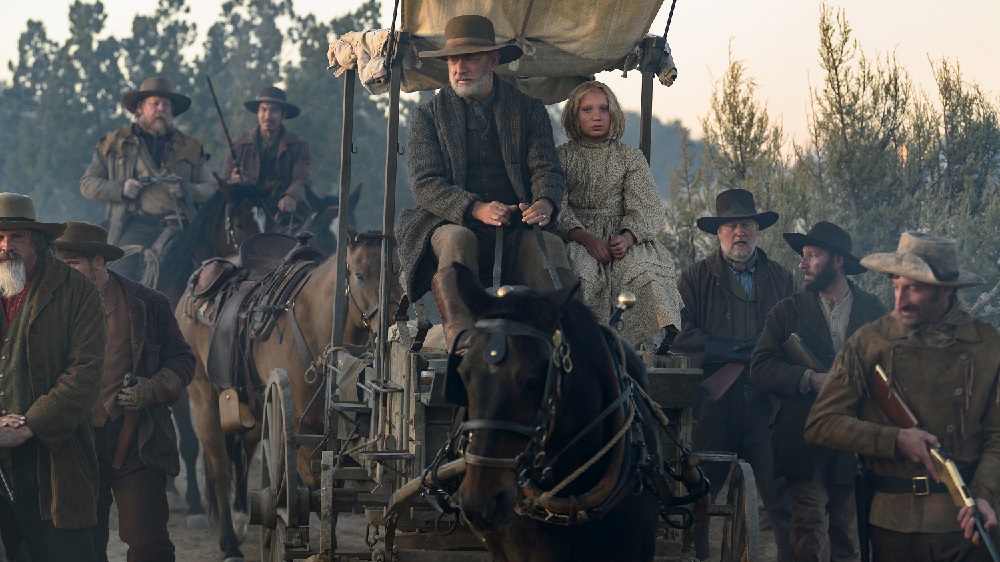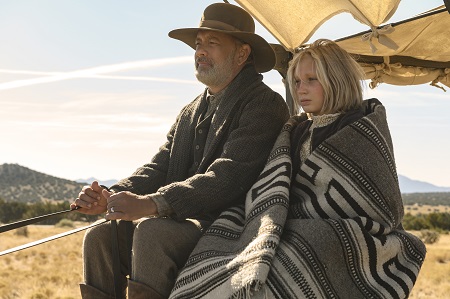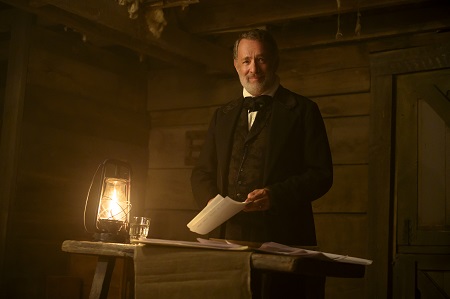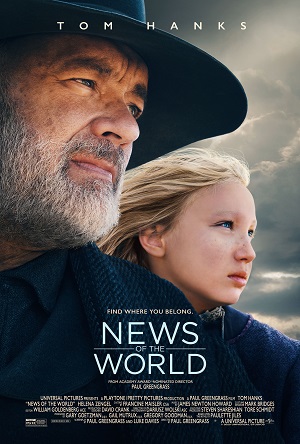
Western News of the World a Hopeful Tale of Emotional Rebirth
Captain Jefferson Kyle Kidd (Tom Hanks) travels from one secluded Texas town to the next to read the news. It’s been five years since the end of the Civil War, and like many who fought on the losing side, life has become something of a constant struggle. But Kidd is a born storyteller, his tales pulled straight from newspaper headlines and townsfolk love it whenever he stops by for one of his evening readings.

Kidd’s life of wandering repetition is interrupted while out on the secluded backwoods roads between stops. This immediately changes the moment he stumbles upon 10-year-old Johanna Leonberger (Helena Zengel). She was taken by the Kiowa tribe six years prior during a raid where her entire immediate family was killed. Recently recovered, against her will she is being turned over to an aunt and an uncle she’s never met.
News of the World is an old school western which easily could have been made by John Ford or Howard Hawks back in the 1940s. Captain Kidd is an emotionally wounded man going through the motions of his life who nonetheless takes it upon himself to protect Johanna and deliver her to the girl’s surviving relatives come what may. Along the way they encounter several terrifying obstacles, fighting through giant sandstorms and fending off armed villains to complete their quest. During the trip they form an almost unbreakable bond, and for both the journey, not the destination, is what ends up being most valuable.
Based on the novel by Paulette Jiles, director and co-writer Paul Greengrass reunites with his Captain Phillips star Hanks, and together the pair once again produce a superb piece of cinematic entertainment that’s exceedingly easy to love. It is a robust, beautifully shot drama, and while little unexpected transpires, the characters are so richly drawn and their travels so wonderfully realized that honestly isn’t much of a problem.
In some ways this is a reverse The Searchers. Instead of a story about trying to find a missing girl taken during a brutal raid, here we have the return trip after recovery. Johanna doesn’t speak English. She barely remembers anything of her life before the slaughter of her family. She’s afraid to trust Kidd and, if it was up to her, she’d rather remain “Cicada” (the name given to her by the Kiowa) and never have been rescued in the first place.
Kidd has his own demons, and they aren’t just due to having fought in the war. He carries a photograph of his beloved wife wherever he goes, and his reasons for never returning home for a visit carry an emotional weight he finds difficult to bear. In protecting Johanna he finds new reasons to, not only carry on, but to revisit this painful past so he can move forward into an unpredictable future.
The inevitability of the outcome for the pair is never in doubt. As strong as the climactic scenes are, that they offer zero surprises might potentially rub some viewers the wrong way. But Hanks is his typical outstanding self, bringing a level of internalized gravitas to the story that’s undeniably moving. Newcomer Zengel matches him step for step; a feat made all the more incredible considering the near-silent nature of her performance. The two are outstanding together, and I loved watching their friendship continually deepen the closer they got to their intended destination.
Greengrass skillfully weaves all the various elements together into a seamless whole, eschewing the quick-cutting documentary-like style he perfected with the likes of Bloody Sunday, United 93 and his first two Jason Bourne efforts (The Bourne Supremacy, The Bourne Ultimatum). Veteran cinematographer Dariusz Wolski (Alien: Covenant) has been gifted a broad outdoor canvass to work with and does wonders with it, each corner of the frame offering something of interest to look at. But he never lets chaos reign, and even during sequences of extreme peril and action I never lost track of who was where or what was happening to any of the characters I cared about the most.
Even though the supporting cast is relatively stacked with familiar faces (Elizabeth Marvel, Mare Winningham, Ray McKinnon, Michael Angelo Covino, Bill Camp, Thomas Francis Murphy, Neil Sandilands and Winsome Brown all make notable, albeit brief, appearances), this remains Hanks and Zengel’s show. They are the focal point, and as such Greengrass doesn’t spend a ton of time fleshing out any of the side characters more than is necessary.

I think what I loved most about this film was how much value is put on the written word. Stories are Captain Kidd’s stock and trade, his oratory excellence as he fleshes out each tale from the pages of area newspapers beyond reproach. Hanks delivers these tales of tragedy, love, sacrifice and humdrum normality with passionate grace, and these brief soliloquies are a reminder of the power of the press and the value placed in honest, trusted reporters.
For all that’s familiar about News of the World, insights like these almost feel groundbreaking. This Western chronicling the early days of a fractured nation putting the pieces back together after a devastating calamity of unfathomable proportions couldn’t be coming out at a more opportune time. Here’s hoping those who need to hear its message of healing and rebuilding community most take the time to listen to what the film has to say.
Film Rating: 3½ (out of 4)






